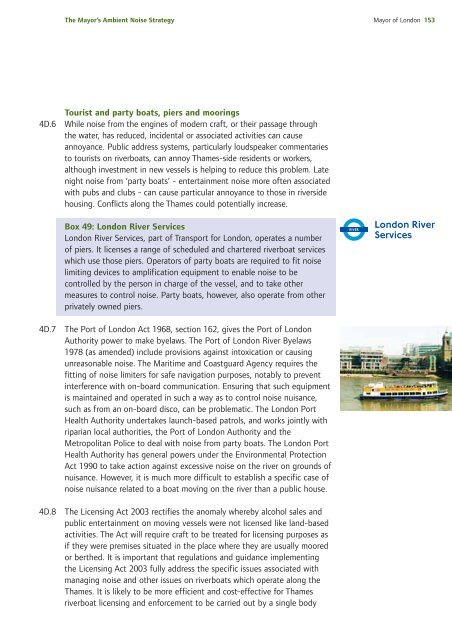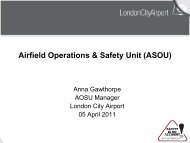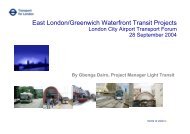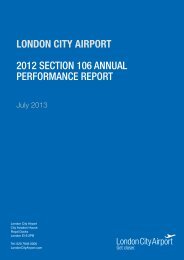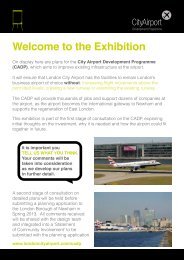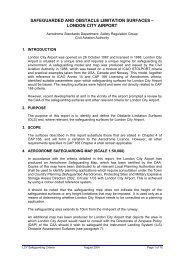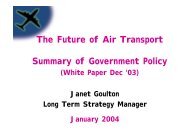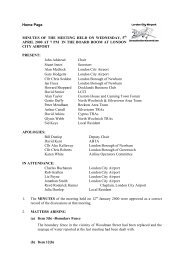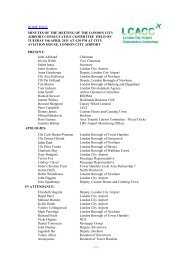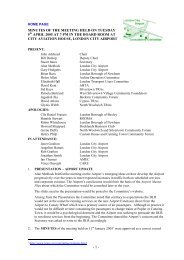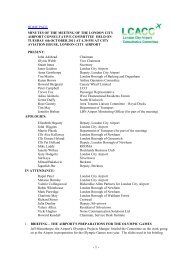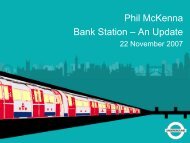The Mayor's Ambient Noise Strategy - Greater London Authority
The Mayor's Ambient Noise Strategy - Greater London Authority
The Mayor's Ambient Noise Strategy - Greater London Authority
You also want an ePaper? Increase the reach of your titles
YUMPU automatically turns print PDFs into web optimized ePapers that Google loves.
<strong>The</strong> Mayor’s <strong>Ambient</strong> <strong>Noise</strong> <strong>Strategy</strong> Mayor of <strong>London</strong> 153<br />
Tourist and party boats, piers and moorings<br />
4D.6 While noise from the engines of modern craft, or their passage through<br />
the water, has reduced, incidental or associated activities can cause<br />
annoyance. Public address systems, particularly loudspeaker commentaries<br />
to tourists on riverboats, can annoy Thames-side residents or workers,<br />
although investment in new vessels is helping to reduce this problem. Late<br />
night noise from ‘party boats’ - entertainment noise more often associated<br />
with pubs and clubs - can cause particular annoyance to those in riverside<br />
housing. Conflicts along the Thames could potentially increase.<br />
Box 49: <strong>London</strong> River Services<br />
<strong>London</strong> River Services, part of Transport for <strong>London</strong>, operates a number<br />
of piers. It licenses a range of scheduled and chartered riverboat services<br />
which use those piers. Operators of party boats are required to fit noise<br />
limiting devices to amplification equipment to enable noise to be<br />
controlled by the person in charge of the vessel, and to take other<br />
measures to control noise. Party boats, however, also operate from other<br />
privately owned piers.<br />
4D.7 <strong>The</strong> Port of <strong>London</strong> Act 1968, section 162, gives the Port of <strong>London</strong><br />
<strong>Authority</strong> power to make byelaws. <strong>The</strong> Port of <strong>London</strong> River Byelaws<br />
1978 (as amended) include provisions against intoxication or causing<br />
unreasonable noise. <strong>The</strong> Maritime and Coastguard Agency requires the<br />
fitting of noise limiters for safe navigation purposes, notably to prevent<br />
interference with on-board communication. Ensuring that such equipment<br />
is maintained and operated in such a way as to control noise nuisance,<br />
such as from an on-board disco, can be problematic. <strong>The</strong> <strong>London</strong> Port<br />
Health <strong>Authority</strong> undertakes launch-based patrols, and works jointly with<br />
riparian local authorities, the Port of <strong>London</strong> <strong>Authority</strong> and the<br />
Metropolitan Police to deal with noise from party boats. <strong>The</strong> <strong>London</strong> Port<br />
Health <strong>Authority</strong> has general powers under the Environmental Protection<br />
Act 1990 to take action against excessive noise on the river on grounds of<br />
nuisance. However, it is much more difficult to establish a specific case of<br />
noise nuisance related to a boat moving on the river than a public house.<br />
4D.8 <strong>The</strong> Licensing Act 2003 rectifies the anomaly whereby alcohol sales and<br />
public entertainment on moving vessels were not licensed like land-based<br />
activities. <strong>The</strong> Act will require craft to be treated for licensing purposes as<br />
if they were premises situated in the place where they are usually moored<br />
or berthed. It is important that regulations and guidance implementing<br />
the Licensing Act 2003 fully address the specific issues associated with<br />
managing noise and other issues on riverboats which operate along the<br />
Thames. It is likely to be more efficient and cost-effective for Thames<br />
riverboat licensing and enforcement to be carried out by a single body


